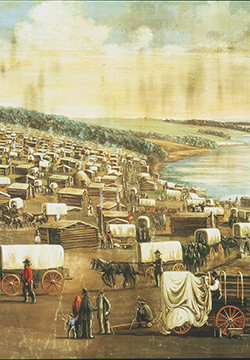Joseph Smith met the Nauvoo Legion at the front of his home and gave orders to have a picket guard posted on all the roads leading out of the city, to have all the powder and lead in the city secured, and to have all the arms put into use.
|
Joseph Smith prepared for the defense of Nauvoo against the growing mob, wrote letters telling those on missions to come home immediately, and advised his brother Hyrum to take his family on the next steamboat to Cincinnati, Ohio.
|
Joseph Smith exchanged letters regarding the growing crisis in Nauvoo with Illinois Governor Thomas Ford and prepared affidavits for him.
|
Joseph Smith was visited by John C. Calhoun Jr. and his brother Patrick, sons of John C. Calhoun, a senator from South Carolina whom Joseph had met in Washington, D.C., in February 1840 and who was now a candidate for United States president.
|
Joseph Smith sent a letter to Illinois Governor Thomas Ford explaining the difficulties in Nauvoo and asking Ford to visit. Governor Ford addressed his reply to the mayor (Joseph Smith) and the Nauvoo City Council and concluded that the destruction of the Nauvoo Expositor was a violation of the laws protecting freedom of the press in the United States.
-
Personal Writings of Joseph Smith, Joseph Smith, 612-14
|
With the promise of full protection pledged by Illinois Governor Thomas Ford, Joseph Smith and his brother Hyrum decided to turn themselves in at Carthage, Illinois, for a hearing.
|
Four miles west of Carthage, Illinois—
Joseph Smith rode from Nauvoo to Carthage, Illinois, turning back, however, to deliver up to Captain James A. Dunn the state arms of the Nauvoo Legion before his final arrival in Carthage.
|
Outside Carthage, Illinois—
Joseph Smith dictated a letter to Illinois Governor Thomas Ford explaining that his arrival in Carthage would be delayed as he was assisting Captain James A. Dunn with the retrieval of state arms from the Nauvoo Legion.
Personal Writings of Joseph Smith, Joseph Smith, 619
|
State v. Hyrum Smith et al.: All seventeen defendants rode to Carthage, finding the town in turmoil.
|
After Joseph and Hyrum Smith surrendered to the authorities in the morning, Illinois Governor Thomas Ford paraded the brothers through the ranks of the troops assembled by his orders from the surrounding counties. The Smiths and the other defendants were arraigned before Justice of the Peace Robert F. Smith, also Captain of the Carthage Greys. The case was postponed until October because Francis Higbee, a key witness, failed to appear. All the defendants posted bail, even in excessive amounts. Joseph and Hyrum were served writs charging them with treason, a nonbailable offense. Despite having no hearing on that new charge, the defendants were taken to Carthage Jail that evening under protective custody.
-
LDS Church Archives, Joseph Smith Legal Papers series
|
